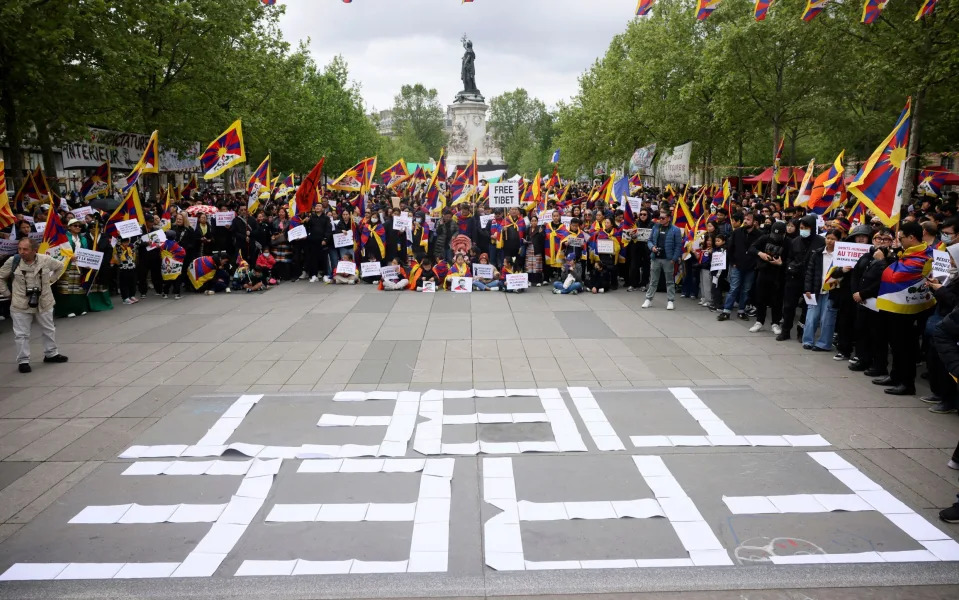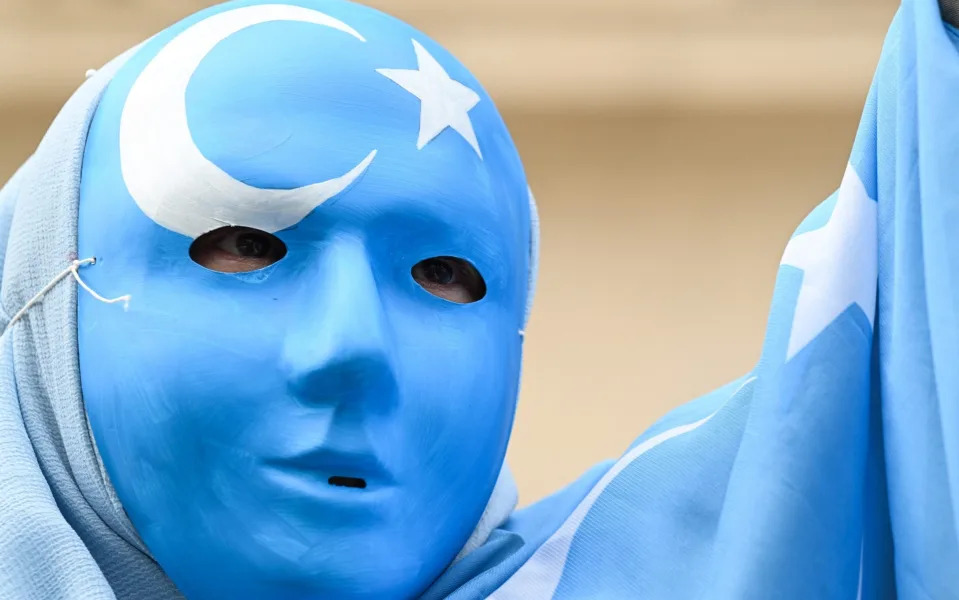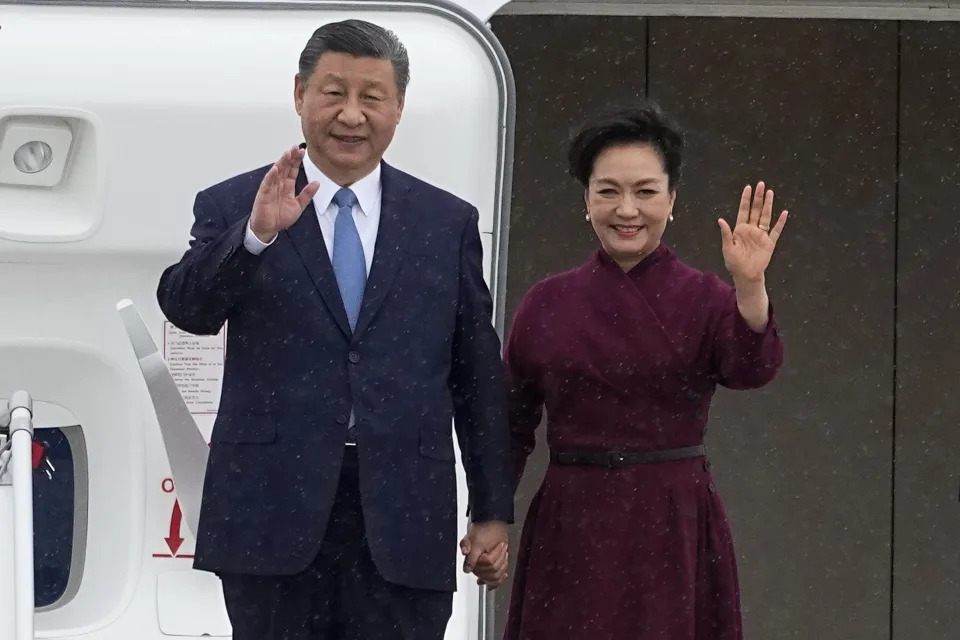China's President Xi Jinping and his wife Peng Liyuan wave as they arrive Sunday, May 5, 2024 at Orly airport, south of Paris. French President Emmanuel Macron will seek to press China's Xi Jinping to use his influence on Moscow to move towards the end of the war in Ukraine, during a two-day state visit to France that will also see both leaders discuss trade issues.
Chinese President Xi Jinping kicked off a three-country trip to Europe on Sunday with the continent divided over how to deal with Beijing's growing power and the U.S.-China rivalry.
European carmakers are losing ground to subsidized Chinese electric vehicles. Diplomats fret about alleged Chinese spies in European capitals. And China’s continued defense trade with Russia worries anyone in Europe who supports war-ravaged Ukraine and fears that the Russian army won’t stop there.
But Europe and China have hefty economic ties — EU-China trade is estimated at 2.3 billion euros per day — and Xi appears determined to rebuild and deepen relations with European leaders after a prolonged absence prompted by the COVID-19 pandemic.
Xi started Sunday in France, whose president wants Europe to have more economic and strategic independence from other world powers. Then the Chinese president heads to Serbia and Hungary, both seen as China-friendly and close to Russian President Vladimir Putin, and recipients of substantial Chinese investment.
Xi's trip will be closely watched in Washington for signs of diminishing European support for its key foreign policy goals. At the same time, there's increasing uncertainty in Europe about future U.S. support for trans-Atlantic allies.
Xi was greeted at Paris’ Orly Airport by French Prime Minister Gabriel Attal — and by protests by groups demanding that France pressure China to respect Tibetan and Uyghur minority rights. Activists seeking a free Tibet attempted to unfurl a banner Saturday beneath the Arc de Triomphe in Paris, and protested in the French capital around the same time as Xi's plane landed.
Get AfriPrime Android Web View app....Click the link to Amazon app store to download https://rb.gy/3xek46
After arriving, Xi said he hoped the visit would bring ‘’strategic convergence'' between China and France, and that further developing their relations would contribute to ‘’stability and positive energy in an turbulent world,'' according to a text provided to reporters at the airport.
On Monday French President Emmanuel Macron will treat the Chinese leader to formal honors of a full state visit. They will also meet with European Commission President Ursula von der Leyen, who is expected to join Macron in pushing for fairer trade policies and for China to use its leverage with Russia to push it toward ending the war in Ukraine.
The EU launched an investigation last fall into Chinese subsidies and could impose tariffs on electric vehicles exported from China.
China claims neutrality in the Ukraine conflict but has refused to call the full-blown Russian assault on its neighbor an invasion, and has been accused of bolstering Russia’s capacity to produce weapons.
Chinese President Xi sets off on first trip to Europe in five years
Chinese President Xi Jinping was set to arrive in Europe on Sunday, on a trip that will take him to France, Hungary and Serbia.
French Prime Minister Gabriel Attal was set to receive Xi in Paris on Sunday afternoon.
Talks with French President Emmanuel Macron and European Commission President Ursula von der Leyen are then scheduled for Monday.
It is Xi's first trip to Europe in five years.
According to the Élysée Palace, the talks in Paris will focus on the war in Ukraine, the situation in the Middle East, economic cooperation and climate protection.
Macron said ahead of the visit that everything must be done to involve China in the major global issues.
It is in our interest "to ensure that China has a say in the stability of the international order," Macron said in an interview published on Thursday by the Economist magazine.
Xi is reportedly seeking to strengthen Chinese relations with Europe, an important trading partner, amid heightened Chinese tensions and economic competition with the United States.
Before Xi's departure, Chinese state media painted a picture in which the Europeans allowed themselves to be pushed into dependence on Washington, particularly after the outbreak of the war in Ukraine.
After his stay in France, 70-year-old Xi will continue on to Serbia and Hungary.
Serbia maintains close relations with China and is a member of China's Belt and Road Initiative, in which Beijing is investing billions in transport routes and harbours worldwide, but particularly in the Global South.
The Hungarian government of Prime Minister Viktor Orbán is also considered to be China-friendly. Hungary is one of the few EU countries to be a member of the Belt and Road Initiative.
Beijing has emphasized the upcoming visits to Serbia and Hungary with particularly friendly words.
China is looking forward to expanding its "iron friendship" with Serbia, said Lin Jian, a spokesman for the Chinese Foreign Ministry.
Get AfriPrime Android Web View app....Click the link to Amazon app store to download https://rb.gy/3xek46
He also described Xi's trip to Hungary as a "landmark visit."
Since Xi's last trip to Europe in 2019, relations have clearly deteriorated. A proposed trade agreement between China and the European Union was put on hold due to tensions and concerns about Chinese human rights abuses, and some EU leaders have warned of excessive economic dependence on China.
The EU has taken action on some trade issues, including threatening tough new tariffs on Chinese electric vehicles, which European regulators contend receive substantial state subsidies and are being sold on the world market at artificially low prices.
China has responded by courting closer relations with France, while also launching its own trade investigation into European brandy.
China has also been heavily criticized in Europe for not taking a stance against the Russian invasion of Ukraine and maintaining close ties with Moscow.
China-France relationship should be model for the world, says Xi Jinping as he lands in Paris
The plane carrying Xi Jinping arrives at Orly airport, south of Paris -
China’s relationship with France should be a model for the world, said President Xi Jinping as he landed in Paris on Sunday.
The Chinese leader made the rare visit to France against a backdrop of mounting trade disputes with the European Union.
French President Emmanuel Macron is set to urge Mr Xi to reduce trade imbalances and to use his influence with Russia over the war in Ukraine.
Mr Xi is due to meet Mr Macron and European Commission chief Ursula von der Leyen on Monday, before he and Mr Macron go on a visit to the Pyrenees the next day.
Mr Xi, who was welcomed in Paris by Prime Minister Gabriel Attal, said in a statement released on his arrival that ties between China and France were “a model for the international community of peaceful coexistence and win-win cooperation between countries with different social systems”.
France is backing an EU probe into Chinese electric vehicle exports, and in January, Beijing opened an investigation into mostly French-made imports of brandy, a move widely seen as a tit-for-tat retaliation.

“We want to obtain reciprocity of exchanges and have the elements of our economic security taken into account,” Mr Macron said in an interview with French newspaper La Tribune ahead of Mr Xi’s two-day visit, his first trip to the region in five years.
Get AfriPrime Android Web View app....Click the link to Amazon app store to download https://rb.gy/3xek46
The EU’s 27 members - in particular France and Germany - are divided on their attitude towards China. German Chancellor Olaf Scholz will not join Mr Macron and Mr Xi in Paris due to prior commitments, sources said.
“In Europe, we are not unanimous on the subject because certain players still see China as essentially a market of opportunities,” Mr Macron said, without naming any countries.
These divisions could undermine the EU’s ability to influence the Asian giant.
France will also seek to make progress on opening the Chinese market to its agricultural exports and to resolve issues around the French cosmetic industry’s concerns about intellectual property rights, officials said.

China may announce an order for around 50 Airbus aircraft during Mr Xi’s visit, but it remains uncertain whether it will be a new deal, people familiar with the negotiations said.
France has been keen to nudge China into pressuring Moscow to halt operations in Ukraine, with little progress apart from Mr Xi’s decision to call President Volodymyr Zelensky for the first time shortly after Macron visited Beijing last year.
“If the Chinese seek to deepen the relationship with European partners, it is really important that they hear our point of view and start taking it seriously,” a French diplomatic source said.
Mr Macron will take Mr Xi to the Pyrenees, a mountainous region dear to the French president as the birthplace of his maternal grandmother, on Tuesday, before Mr Xi heads to Russia-friendly Serbia and Hungary.
China's Xi in France for Macron talks on Ukraine
Chinese President Xi Jinping on Sunday arrived in France on a state visit hosted by Emmanuel Macron where the French leader will seek to push his counterpart on issues ranging from Ukraine to trade.
Xi's arrival for the visit marking 60 years of diplomatic relations between France and China heralded the start of his first trip to Europe since 2019, which will also see him visit Serbia and Hungary.
But Xi's choice of France as the sole major European power to visit indicates the relative warmth in Sino-French relations since Macron made his own state visit to China in April 2023 and acknowledges the French leader's stature as an EU powerbroker.
Get AfriPrime Android Web View app....Click the link to Amazon app store to download https://rb.gy/3xek46
The leader of the one-party Communist state of more than 1.4 billion people, accompanied by his wife Peng Liyuan, was welcomed under umbrellas at a drizzly Paris Orly airport by Prime Minister Gabriel Attal.
Xi is to hold a day of talks in Paris on Monday -- also including EU Commission chief Ursula von der Leyen -- followed by a state banquet hosted by Macron at the Elysee.
Tuesday will see Macron take Xi to the Pyrenees mountains to an area he used to visit as a boy for a day of less public and more intimate talks.
Quoted on arrival in Paris by the Xinhua state news agency, Xi said the development of China-France relations had "injected stability and positive energy into the turbulent world" and China was ready to "enhance political mutual trust, build strategic consensus and deepen exchanges" during the visit.
- 'Stability of international order' -
A key priority of Macron will be to warn Xi of the danger of backing Russia in its invasion of Ukraine, with Western officials concerned Moscow is already using Chinese machine tools in arms production.
Beijing's ties with Moscow have, if anything, warmed after the invasion and the West wants China above all not to supply weapons to Russia and risk tipping the balance in the conflict.
"It is in our interest to get China to weigh in on the stability of the international order," said Macron in an interview with the Economist published on Thursday.
"We must, therefore, work with China to build peace," he added.
Macron also said in the same Economist interview that Europe must defend its "strategic interests" in its economic relations with China, accusing Beijing of not respecting the rules on international trade.
But he acknowledged in an interview with the La Tribune Dimanche newspaper that Europeans are "not unanimous" on the strategy to adopt as "certain actors still see China essentially as a market of opportunities" while it "exports massively" to Europe.
The French president had gladdened Chinese state media and troubled some EU allies after his 2023 visit by declaring that Europe should not be drawn into a standoff between China and the United States, particularly over democratic, self-ruled Taiwan.
China views the island as part of its territory and has vowed to take it one day, by force if necessary.
Get AfriPrime Android Web View app....Click the link to Amazon app store to download https://rb.gy/3xek46
"The worst thing would be to think that we Europeans must be followers and adapt ourselves to the American rhythm and a Chinese overreaction," Macron said at the time, warning against a "bloc versus bloc logic".
- 'Two core messages' -
Rights groups are urging Macron to bring up human rights in the talks, accusing China of failing to respect the rights of the Uyghur Muslim minority and keeping dozens of journalists behind bars.
"President Macron should make it clear to Xi Jinping that Beijing's crimes against humanity come with consequences for China's relations with France," said Maya Wang, acting China director at Human Rights Watch.
The group said human rights in China had "severely deteriorated" under Xi's rule.
However analysts are sceptical that Macron will be able to exercise much sway over the Chinese leader, even with the lavish red carpet welcome and a trip to the bracing mountain airs of the Col du Tourmalet over 2,000 metres (6,560 feet) above sea level on Tuesday.
The other two countries chosen by Xi for his tour, Serbia and Hungary, are seen as among the most sympathetic to Moscow in Europe.
"The two core messages from Macron will be on Chinese support to Russia's military capabilities and Chinese market-distorting practices," said Janka Oertel, director of the Asia programme at the European Council on Foreign Relations.
"However, both messages are unlikely to have a significant impact on Chinese behaviour: Xi is not on a mission to repair ties, because from his point of view all is well."
China’s Xi Jinping is visiting Europe for the first time in five years – his goodwill tour will be an uphill struggle
When Xi Jinping arrived in Italy for a state visit in 2019, he was given a lavish welcome, with private tours of Roman landmarks and a dinner serenaded by opera singer Andrea Bocelli, topped with a crowning flourish – Italy’s decision to join Xi’s signature Belt and Road infrastructure initiative.
Five years later, on his first return to the continent since then, the Chinese leader will land in a very different climate. While the pomp and ceremony may remain as Xi begins his six-day European tour in France on Sunday, views on China across the continent have shifted dramatically.
In the past weeks alone, the European Union has launched trade probes into China’s wind turbines and procurement of medical equipment, and raided offices of Chinese security equipment maker Nuctech as part of an investigation into subsidies. Germany and the United Kingdom in recent days also arrested or charged at least six people for alleged espionage and related crimes linked to China.
And in March, Italy formally exited the Belt and Road, costing the program its only G7 member country, in a blow to China and its leader.
Behind these developments are mounting economic grievances that have the EU preparing for a potential major trade confrontation with China – as well as growing suspicions about Beijing’s global ambitions and influence driven by alarm over China’s deepening ties with Russia as it wages war against Ukraine.
Get AfriPrime Android Web View app....Click the link to Amazon app store to download https://rb.gy/3xek46
“China is seen increasingly as a multi-faceted threat in many European capitals. But there are divisions within Europe over how fast and far to go in addressing concerns about China, both in the economic and security spheres,” said Noah Barkin, a Berlin-based visiting senior fellow at the German Marshall Fund of the United States.
Now, Xi’s trip – with stops in France, Serbia and Hungary – is an opportunity to woo his critics, but also showcase that even as views are hardening in some parts of Europe, others still welcome China with open arms.
Beijing is keen to dampen Europe’s push to address alleged trade distortions, which would come at a bad time for its flagging economy. It also wants to ensure Europe doesn’t draw any closer to the US, especially amid uncertainty over the outcome of the upcoming US election.
Major breakthroughs with China’s toughest critics will be hard to come by unless Xi is ready to make surprise concessions. And the trip could instead serve to underscore divisions – not only between Europe and China – but those within Europe that could play to China’s favor, analysts say.
Trade frictions
Xi’s visit is set to start with one of his toughest critics.
The Chinese leader is slated to meet European Commission President Ursula von der Leyen alongside French President Emmanuel Macron on Monday.
Von der Leyen has spearheaded the EU’s rallying cry to “derisk” its supply chains from China over concerns about securing its key technologies, and is driving a high-stakes anti-subsidy investigation backed by France into the influx of Chinese electric vehicle (EV) imports to Europe.
China earlier this year opened an investigation into the price of EU-imported brandy in a move that could hit France’s cognac sector and is widely seen as retaliation for the probe.
In his meetings, Xi will likely press Beijing’s message that “derisking” from China is perilous for Europe – while pushing back on European concerns about China’s alleged overcapacity and subsidies and instead highlighting the role Chinese EVs can play in European and global efforts to reduce the use of fossil fuels.
Xi used similar rhetoric in a meeting in Beijing with German Chancellor Olaf Scholz last month, in which critics accused the German leader of being too soft on China.
But such talk, without any tangible trade or reciprocal market-access commitments, is unlikely to move the needle for Von der Leyen, who wants to find ways to address perceived trade distortions before EU parliamentary elections in June, observers say.
Xi may instead see more opportunity to win goodwill during his one-on-one time with Macron, which is expected to include not only meetings in Paris but what Elysee sources described as more “personal” time in the Pyrenees mountains of southern France.
“France has built this reputation of being a fairly independent actor in the EU and willing to create some space with the US,” said Chong Ja Ian, an associate professor of political science at the National University of Singapore.
“Xi may want to work on Macron to see if he can get more European distance from North America,” as well as tightening his rapport with this important EU player, Chong said.

Push for peace
The war in Ukraine – a crucial sore point in Europe-China relations – is also expected to be on the agenda in meetings early this week, where Xi may seek to bolster China’s attempts to position itself as peacemaker.
“President Xi will explain to President Macron about China’s relations with Russia … (that) China can be a broker to bridge the gaps between Europe and Russia,” said Wang Yiwei, a professor of international relations at Beijing’s Renmin University, pointing to an upcoming peace summit in Switzerland as a potential venue for a diplomatic push.
But Beijing has appeared to do little to move the Kremlin toward European visions for peace in Ukraine, despite repeated efforts to push Xi to use his rapport with President Vladimir Putin. Putin has said he plans to visit China this month, according to Russian state media.
Xi’s visit comes as the US and its European allies grow increasingly vocal about concerns China’s exports of dual-use goods to Russia are powering its war machine. Beijing defends that trade as a regular part of its bilateral relations.
Macron and Von der Leyen would likely warn Xi their relationship “risks deteriorating further” if China continues to provide those goods, according to Barkin in Berlin.
However, “there is little evidence that these messages are leading to noticeable changes in Beijing’s behavior,” he said, adding that “at some point soon” Europe could decide to move more aggressively in sanctioning Chinese firms selling such goods.
A warmer welcome
Xi’s stops in Serbia and Hungary are likely to be much less contentious – something the Chinese government likely factored in when mapping out the visit, observers say.
“In Belgrade and Budapest, Xi will not have to listen to the criticism he hears in other European capitals,” said Barkin. “Their leaders welcome Chinese investment, and they don’t have a problem with China’s deepening ties to Russia.”
Get AfriPrime Android Web View app....Click the link to Amazon app store to download https://rb.gy/3xek46
Xi’s visit to Belgrade will coincide with the week of the 25th anniversary of NATO’s bombing of the Chinese embassy in Belgrade that killed three. The attack, part of a wider bombing campaign by NATO in the Balkans during the spring of 1999, drove Beijing’s deep enmity for the alliance, even as the US said it was an accident.
Any commemoration of the event by Xi could underscore the deep divisions between the China and NATO, which Beijing sees as an embodiment of American overreach and a source of Europe’s security challenges – a view that has driven it closer to Russia.
Xi may also look to highlight Chinese investments in both Belgrade and Budapest in a message to the rest of Europe.
Non-EU member Serbia, which Beijing earlier this week described as an “iron-clad” friend, has seen growing trade and investment ties with China under President Aleksandar Vučić.
In January, the Balkan nation announced a deal that could see more than $2 billion of Chinese investment in wind and solar power plants and a hydrogen production facility, Reuters reported at the time.
In Hungary, Xi will look to deepen his relationship with increasingly authoritarian Prime Minister Viktor Orban – a useful ally for China in the European Union, where he has blocked or criticized EU efforts to hold China to account on human rights issues.
The central European country has also emerged as an increasingly important production hub in Europe for Chinese automotive suppliers including EV makers – a situation that analysts say could help Chinese firms maneuver around existing and potential EU tariffs.
That means Xi is likely to exit his trip on a very different note from the one he begins with.
“There, at least, the optics will be that there’s a lot of acceptance of Xi,” said Chong.




